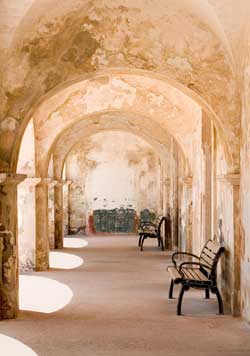Summer Travel Program
Caribbean Studies Summer Institute
Puerto Rico and the Virgin Islands
Photo Gallery from the Caribbean Studies Institute
About the Program
The Caribbean region can be understood as a fascinating natural laboratory of cultural and ethnic diversity. The Departments of Sociology and Anthropology of UMass Boston, in collaboration with the University of Puerto Rico at Cayey and the University of the Virgin Islands, have designed a four-week Caribbean Studies Summer Institute comprised of an integrated set of courses dedicated to the study of the historical, socio-political, and economic structures and processes that have shaped the Caribbean into the culturally complex region it is today. The Institute’s courses will be jointly directed and taught by Jorge Capetillo-Ponce, Assistant Professor of Sociology and Research Associate at the Mauricio Gastón Institute, UMass Boston; Luis Galanes, Professor of Anthropology and Chair of the Social Science Department at University of Puerto Rico at Cayey; and faculty of the University of the Virgin Islands.Program Focus
 The program offers students an interdisciplinary approach integrating sociological, anthropological, and historical perspectives to the study of Caribbean society and culture. Students will be introduced to key social-scientific concepts such as race, ethnicity, nation, culture, and their relevance (or irrelevance) in the attempt to understand Caribbean cultures and identities. Students will learn about the contributions of different ethnic groups to modern Caribbean culture, and examine the processes by which these various contributions were blended and transformed through cultural interactions, taking into account the power relations between groups throughout the colonial, imperial, and post-independence historical periods. Students will also be introduced to the major issues regarding U.S. involvement in the Caribbean. The intent will be to consider the variety of traditions making up Caribbean identity, in particular Afro-Caribbean identities, but also identities based on Hispanic, English, French, Dutch, East Indian, Native Indian, and mestizo heritage, among others, as well as identity issues in countries and regions on the Atlantic coast of Central and South America.
The program offers students an interdisciplinary approach integrating sociological, anthropological, and historical perspectives to the study of Caribbean society and culture. Students will be introduced to key social-scientific concepts such as race, ethnicity, nation, culture, and their relevance (or irrelevance) in the attempt to understand Caribbean cultures and identities. Students will learn about the contributions of different ethnic groups to modern Caribbean culture, and examine the processes by which these various contributions were blended and transformed through cultural interactions, taking into account the power relations between groups throughout the colonial, imperial, and post-independence historical periods. Students will also be introduced to the major issues regarding U.S. involvement in the Caribbean. The intent will be to consider the variety of traditions making up Caribbean identity, in particular Afro-Caribbean identities, but also identities based on Hispanic, English, French, Dutch, East Indian, Native Indian, and mestizo heritage, among others, as well as identity issues in countries and regions on the Atlantic coast of Central and South America.
The courses will draw heavily on the study of material culture and cultural productions (archeological sites, architecture, literature, plastic arts) interpreted as "texts" that speak about the political, economic and social conditions in which they were produced, and which ultimately point to the debates that play a key role in the construction of contemporary identities in the region. Social science methodology will be strongly emphasized with a view to helping students develop research projects.
Program Agenda
| June 8-16 | San Juan and Cayey (University of Puerto Rico) |
| June 17-23 | Vieques, classes will take place at the Cultural Center located in the old Spanish fort |
| June 23-27 | St. Croix (University of Virgin Islands) |
| June 27 -July 5 | St. Thomas (University of Virgin Islands) with one-day trip to Tortola in the British Virgin Islands and one-night stay at a campground in the neighboring island of St. John, for the Independence Day Carnival |
Academic Credit
Upon successful completion, students earn a total of 9 undergraduate credits in three UMass Boston courses (award of graduate level credit is possible by special arrangement in some cases):
- SOCIOLOGY 321L, Race and Ethnic Relations Focus on the Caribbean, 3 credits
- ANTHROPOLOGY 274, Peoples and Cultures of the Caribbean, 3 credits; and
- Either: SOCIOLOGY 478, Directed Study in Sociology; or, ANTHROPOLOGY 478, Directed Study in Anthropology, 3 credits.
- Graduate level credit is possible by special arrangement. Applicants interested in graduate credit must seek and obtain permission before registering for the program.
